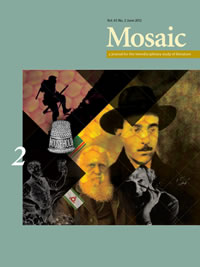Issue 45.2
Overview

General Issue
Published: June 2012
View the issue introduction or see the issue summary and contents below.
10 essays, totalling 192 pages
$21.95 CAD
Several recurrent themes mark the ten essays in this outstanding Mosaic general issue, among them: trauma, silence, autobiography, deportation memory, the idea of community, Darwinian criticism, fetal-alcohol narrative, the photobook, the poetics of non/sense, and the regional imaginary. The issue takes up these and other themes by engaging the work of a wide range of writers, musicians, and artists, including John Cage, Margaret Atwood, Thomas King, Raymond Roussel, and Fernando Pessoa.
Obscurity and the Poetics of Non/Sense in the Writings of Raymond Roussel and Fernando PessoaEldritch Priest In this essay I examine how Raymond Roussel and Fernando Pessoa extract a poetics of nonsense from the limitations of language’s signifying potential. From the peculiar self-reflexive rhythm(s) of their work I draw the speculation that meaning and thinking are contagious matters. | |
Writing through Merce: John Cage’s Silence, Differends, and Avant-Garde IdiomsAndy Weaver This essay explores John Cage’s silence about his homosexuality in relation to Jean-François Lyotard’s theorizations of the differend and the avant-garde. Examining several of Cage’s poems, I argue that Cage’s silence was a source of strength and that Cage silently spoke his homosexuality in avant-garde idioms. | |
“The poor man’s club”: The Middle Classes, the Public House, and the Idea of Community in the Nineteen-ThirtiesBen Clarke This essay analyzes the ways in which interwar writers such as Hamilton, Hampson, Massingham, Orwell, and those involved with Mass-Observation rewrote Victorian ideas of pubs as the products of personal failure, figuring them instead as communal centres. It explores images of the public house as a refuge from advanced capitalism and the social functions it actually served. | |
Secular Apocalypses: Darwinian Criticism and Atwoodian FloodsAndrew Hoogheem This essay engages Brian Boyd’s On the Origin of Stories, a major work of evolutionary literary criticism, with Margaret Atwood’s dystopia The Year of the Flood. Bringing these texts into dialogue demonstrates both the power of and some potential limits to an evocritical interpretive paradigm, particularly with respect to religion. | |
Photographic Documents and Postmodern Fictions: Photobooks by Susan Meiselas and Gregory CrewdsonMarion K. McInnes Susan Meiselas’s historical photographs in Nicaragua contrast sharply with Gregory Crewdson’s postmodern, overtly fictional photographs in Twilight. Examining differences in the photographers’ depiction of time, action, public space, and gender, this essay argues that the two photobooks resist neat distinctions between the photograph as document and the photograph as picture. | |
“Never Meant To Be”: Porcupines and China Dolls as a Fetal-Alcohol NarrativeHelen Hoy This essay makes the connection between Robert Alexie’s Porcupines and China Dolls and social-political issues around Fetal-Alcohol Spectrum Disorders (FASD) for Canada’s First Nations. It proposes and problematizes a Fetal-Alcohol reading of the novel, using it as a paradigm for the complexities of discussing possible FASD in First Nations communities. | |
Helen’s Quilt as Autobiographical, Social, and Political Text in Thomas King’s Truth and Bright WaterDeborah Weagel Helen’s quilt in Thomas King’s novel Truth and Bright Water tells the story of her personal metamorphosis and, as such, can be viewed as an autobiographical, social, and political text. This essay illustrates how, through quiltmaking, Helen finds discrete parts of herself and emerges from erasure as an indigenous woman. | |
Reading Modernity in Mambety’s La Petite vendeuse de soleil: Orality, Literacy, and the Regional ImaginaryAnn Elizabeth Willey Mambety’s final film, La Petite vendeuse de soleil, presents the intersection of orality and literacy in a globalized Dakar while rejecting dichotomous discourses of tradition versus modernity. This essay argues that the film posits appropriation and communal redefinition of modern technologies as an important part of Africa’s struggle against neo-colonial dependence. | |
Leaving the House of Memory: Post-Soviet Traces of Deportation MemoryRebecca Gould Drawing on Pierre Nora’s contribution to memory studies, this essay examines the mediation of history by deportation memory. Literary texts and ethnography are used to illuminate the historical experience of two Muslim peoples of the Caucasus: the Chechens, deported to Central Asia in 1944, and the Hunzib, who remained behind. | |
Screened Trauma: World War II, Dead(ly) Women, and Wilson’s Hetty DorvalChrista Zeller Thomas Ethel Wilson’s first novel, Hetty Dorval, is generally regarded as a story of the triumph of good over attractive, female evil. This essay analyzes the novel as a “screen” or “cover” for underlying anxieties in order to examine the unconscious linkages between cultural concepts of (maternal) femininity and death. |